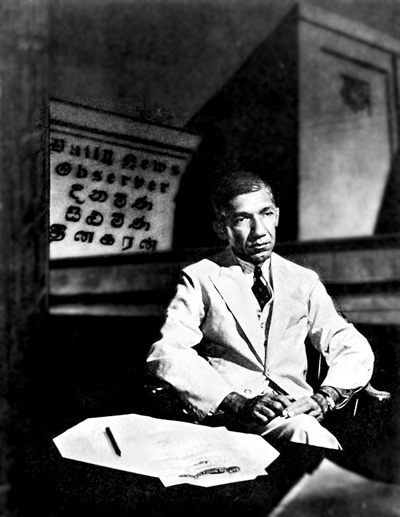News
D R Wijewardene: An architect of Independence
When a nation wins independence, individual credits quite often get muted into silence. The victory is celebrated as a communal achievement and, with the exception of a few prominent actors occupying centre stage, most others in the drama tend to get forgotten, or to be overshadowed by larger and more flamboyant reputations. Some do not receive due reference because they are content to play their role behind the scenes assuming an impersonal silence by deliberate choice. 
In the achievement of Sri Lanka’s independence and specifically, in the winning of universal adult franchise, the massive contribution made by Mr D R Wijewardene is a story that has never been properly assessed and adequately chronicled.
This seeming neglect is due largely to “D R” himself, for whom publicity was something that had to be given, but rarely received. Still, to restore proper perspective, his substantial role in the struggle for national independence should be viewed with the deference it so rightly deserves.
On some rare occasions when D R was persuaded to interrupt his customary silence about his own achievement, he provided unusual insights into the process of Sri Lanka’s struggle for independence. One such memorable occasion was the 25th anniversary of the “Ceylon Daily News” on January 3, 1943.
With characteristic modesty, he introduces his views this way: “It is not possible to deal with the subject adequately without providing a background of autobiography: but I must apologise in advance for anything in the following account that may appear unduly personal.”
We as a nation would have been exceptionally grateful to him had he been more personal, since his own story was so exquisitely intertwined with the emergence of the country into independent nationhood.
Even his reticent, impersonal and restrained remarks help to fill in the gaps in the story of Sri Lanka’s achievement of universal adult franchise. Consider this for instance:
“Mr (F H M) Corbet showed me the ropes in the delicate task of interesting Members of Parliament in the domestic affairs of a Crown Colony. Among those whom I was able to interest were Sir Henry Cotton, who put the first question in the House of Commons on the desirability of extending the principle of representative government in Ceylon.”
While in London, D R was more than a back-stage manipulator of reform deputations from Sri Lanka. His personal links with prominent political leaders in London proved an asset to Sri Lankan fighters for freedom, when they sought audience with high officials responsible for the administration of colonies.
When he returned to Sri Lanka, after being called to the Bar, he plunged enthusiastically into the task of giving shape and organisation to the political activities of the country. He had acquired a British relish for political negotiations and for careful, conscientious and dedicated social service as a cultivated accomplishment. He infused new life into the dormant and inactive Ceylon National Association, the oldest political organisation in the country.
The launching of newspapers notably the “Dinamina” and the “Ceylon Daily News”, was part of his positive approach to the political problems of the land. He never entertained personal ambitions for a public political career. As a result, he was able to adopt a singularly dispassionate approach towards the political issues of the country.
His steady goal was the country’s independence. He possessed the courage and devotion to pursue this aim, undaunted. When freedom was won on February 4, 1948, D R was quite aware that his own role in this victory was not in any way insignificant. But, with the impersonality D R always cherished, he attributed his own contribution to his Press. In an article published in February, 1948 D R wrote:
“From the very beginning of its career, the ‘Daily News’ fought for self-government for the people of Ceylon, not as a gift or boon, but as an inalienable right. It was not going to be satisfied with piecemeal concessions.”
Sri Lanka’s prestigious stature today in the world community is the direct, historical outcome of the tenacious spirit of giant personalities so eminently symbolized by D R Wijewardene.
Today’s leaders, in their determination to celebrate the high democratic achievement represented by Fifty Years of Universal Adult Franchise in Sri Lanka, also celebrate in effect those pioneering individuals who possessed this gift of a foresight that leapt far into the future, defying narrow contemporary confines.

